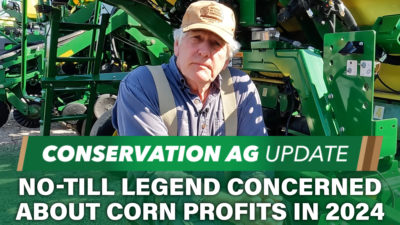PITTSBURGH, Pa. — The Heinz Family Foundation named Gabe Brown, a pioneer in regenerative agriculture and soil health, and Jacqueline Patterson, M.S.W., M.P.H., environmental justice advocate and founder of the Chisholm Legacy Project, the recipients of the prestigious 26th Heinz Awards for the Environment.
As part of the accolade, Mr. Brown and Ms. Patterson will each receive an unrestricted cash award of $250,000.
Gabe Brown is a leader in regenerative agriculture and soil health who is catalyzing the movement to change farming practices. The results he achieves at his highly productive 5,000-acre farm, Brown’s Ranch, together with his first-hand farming experience and passion for sharing his journey are inspiring farmers to shift from conventional to regenerative methods, transforming farmland from an environmental problem to a solution.
Mr. Brown began experimenting with new farming practices after a series of weather-related crop disasters at his North Dakota farm put his family in desperate financial straits. In 1993, he adopted no-till practices for moisture conservation, and went on to implement other soil-building practices, including diverse cover cropping, complex crop rotation and the incorporation of perennials. In 2001, he ceased the application of synthetic pesticides and fungicides and stopped using synthetic fertilizers in 2007. He is a leader in rotational grazing approaches that maintain plant diversity and soil health, while lowering disease risk for livestock.
The resulting improvements in soil fertility, drought resistance and crop nutrition have transformed his land into a highly profitable farm ecosystem that sequesters carbon, supports wildlife and grows an abundance of high-quality food. Mr. Brown’s farm realizes crop yields that are equal to or higher than neighboring farms while improving stability during intense rain events and droughts. Scientists documenting soil conditions on Brown’s Ranch have found that soil organic matter has increased at rates that defy long-held predictions, increasing from just less than 2% to 5-8%. Topsoil depths have been measured at four to five times the average and soil carbon has been measured at 96 tons per acre, 180 tons in some areas, a figure far higher than the 10-30 tons per acre that is typical for the region.
“As rewarding as it is to see the positive impacts of regenerative practices on my own ranch, helping other farmers and ranchers make the transition from the chemical-intensive conventional agriculture model to the low-input regenerative agriculture model has been the most gratifying,” says Gabe Brown. “Through my work with Understanding Ag and the nonprofit Soil Health Academy, I'm seeing how regenerative agriculture is restoring the health of our living soil; increasing biodiversity and carbon sequestration; improving water infiltration and quality; improving the nutrient density of our food; and importantly, improving the profitability of family farms. Every day, we see proof that soil health-improving regenerative agriculture represents an enormous opportunity for farmers, consumers and our planet—and why it holds the promise of ‘common ground for common good.’”
Recognizing that adoption of more ecologically based farming practices requires farmer-to-farmer training, better farmer networking and a culture of ideas exchange, Mr. Brown is dedicated to sharing what he has learned. He reaches thousands of farmers annually through speaking and consulting engagements and soil health training sessions. Additionally, his book, Dirt to Soil: One Family’s Journey into Regenerative Agriculture, has become a key resource for both novice and seasoned farmers.
“John Heinz was committed to protecting the environment and had a great gift for building bridges with those who initially may not have shared his point of view,” says Teresa Heinz, Chairman of the Heinz Family Foundation. “We honor Gabe for developing a new approach to agriculture that recognizes the interconnection of land, food and climate change, and for his dedication as a thought leader demonstrating that environmentally conscious farming techniques not only heal the soil, they also produce healthier food, greater yields and a better financial return for those who depend on the land for their livelihood.”
Created to honor the memory of the late U.S. Senator John Heinz, the Heinz Awards honors excellence and achievement in areas of great importance to Senator Heinz. The 26th awards bring the total number of recipients to 158 and reflect more than $30 million given since the program was launched in 1993.
Recipients of the 26th Heinz Awards will be honored at a virtual event in December. For more information on the awardees, visit https://heinzawards.net/2021.







Post a comment
Report Abusive Comment